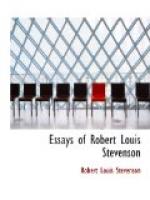To come at all at the nature of this quality of romance, we must bear in mind the peculiarity of our attitude to any art. No art produces illusion; in the theatre we never forget that we are in the theatre; and while we read a story, we sit wavering between two minds, now merely clapping our hands at the merit of the performance, now condescending to take an active part in fancy with the characters. This last is the triumph of romantic story-telling: when the reader consciously plays at being the hero, the scene is a good scene. Now in character-studies the pleasure that we take is critical; we watch, we approve, we smile at incongruities, we are moved to sudden heats of sympathy with courage, suffering or virtue. But the characters are still themselves, they are not us; the more clearly they are depicted, the more widely do they stand away from us, the more imperiously do they thrust us back into our place as a spectator. I cannot identify myself with Rawdon Crawley or with Eugene de Rastignac,[28] for I have scarce a hope or fear in common with them. It is not character but incident that woos us out of our reserve. Something happens as we desire to have it happen to ourselves; some situation, that we have long dallied with in fancy, is realised in the story with enticing and appropriate details. Then we forget the characters; then we push the hero aside; then we plunge into the tale in our own person and bathe in fresh experience; and then, and then only, do we say we have been reading a romance. It is not only pleasurable things that we imagine in our day-dreams; there are lights in which we are willing to contemplate even the idea of our own death;




